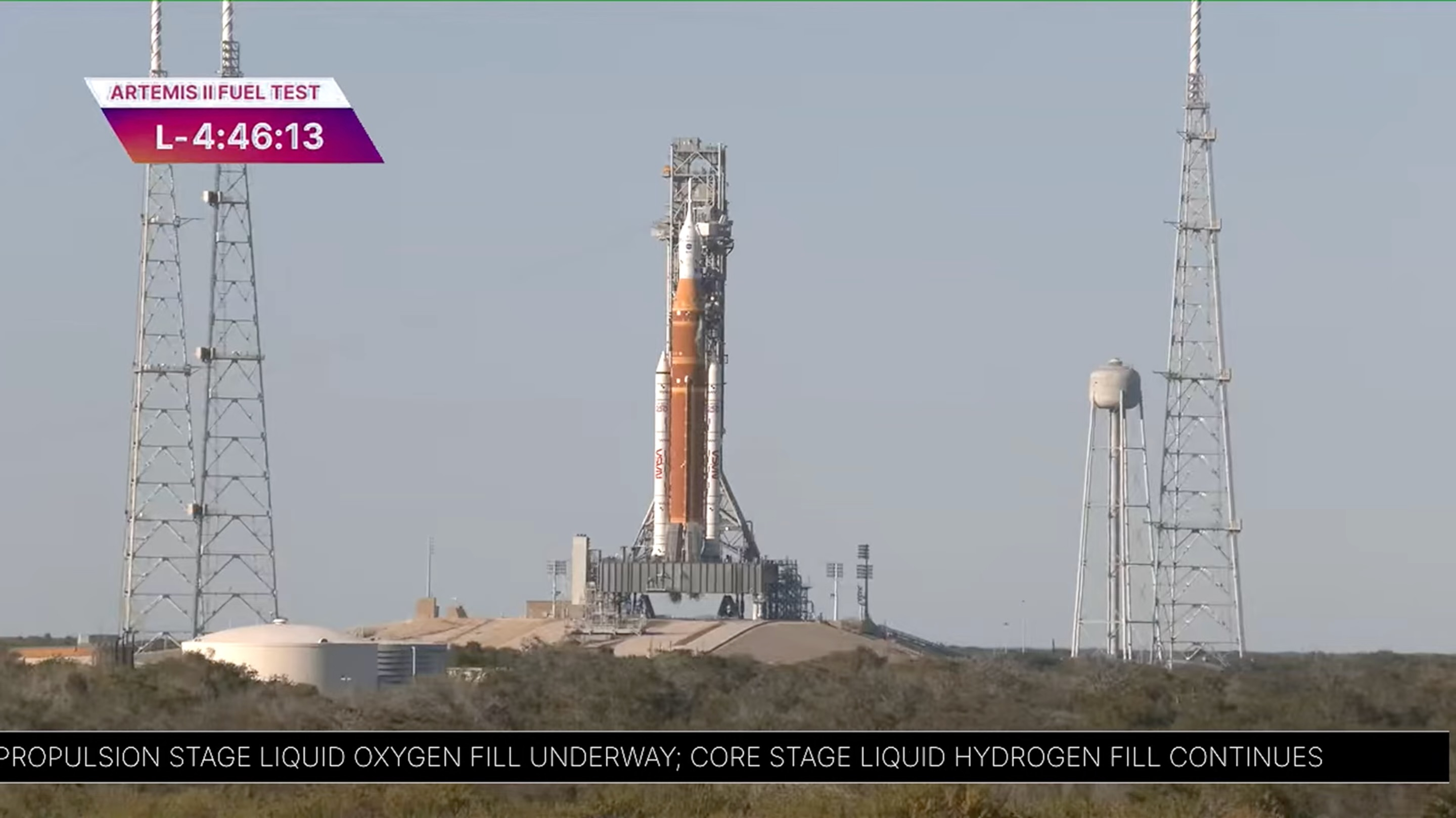ISS Crew Counts Calories as Food Supply Runs Low
With food stores running low, the two astronauts living aboard the International Space Station (ISS) are cutting back their meal intake and awaiting a critical cargo delivery expected to arrive on Dec. 25.
ISS Expedition 10 commander Leroy Chiao and flight engineer Salizhan Sharipov are scaling down their daily caloric intake by up to 10 percent, but will meet their daily nutritional requirements and should not experience any discomfort, NASA space station officials said today. Current food supplies will hit critical just as the resupply ship is due, with water supplies lasting through Jan. 18, they added.
"We knew our situation was tight and we continue to monitor those consumables closely," said William Gerstenmaier, NASA ISS program manager, during a briefing with reporters. "This crew has not been eating excessively in any shape or form."
Chiao and Sharipov arrived at the station aboard their Soyuz capsule on Oct. 16 and have spent nearly two months onboard the orbital platform. A Russian-built cargo spacecraft, Progress 16, was originally slated to haul fresh food, water and other supplies to the station last month, but delayed until late December. The supply ship is now set to launch from Baikonur Cosmodrome in Kazakhstan on Dec. 23 and dock with the ISS two days later.
"This 16 Progress is very critical, no doubt about that, but not any more critical than the last Progress or when we launched the last Soyuz," Gerstenmaier said. "We kind of launched into this situation with the idea of what we were going to do, and we have teams tracking this all the time."
The Expedition 10 crew has entered a 45-day period known as a skip cycle by ISS managers, who have begun drawing up plans to evacuate the space station should the Progress 16 resupply flight fail or suffer delay. The space station will only have 7-14 days of food remaining when Progress 16 is expected to arrive, during which time they would have to return home if the 107-day supply of food doesn't arrive.
"We have to be ready," Gerstenmaier said of evacuating the crew, adding that ISS controllers were similarly prepared during Expedition 10's recent Soyuz relocation maneuver should they're spacecraft fail to dock properly with the station. "We were fully prepared to return the crew then too."
Breaking space news, the latest updates on rocket launches, skywatching events and more!
Counting calories and pounds
On the average, ISS astronauts consume about 3,000 calories during any given day in space. Under the current plan, Chiao and Sharipov will scale down to about 2,700 calories at most.
"It is well within the optimal and nutritional guidelines that they follow," explained Sean Roden, Expedition 10 flight surgeon, during the briefing.
Space station meals come in individual packages that cannot be separated into smaller portions and saved for later, Roden said. But the crew can manage their meals by cutting out a whole package depending on their appetite, he added.
Space station managers said they would not swap out 12 pounds (5.4 kilograms) of new science experiments and equipment to fly aboard Progress 16 for additional food, though the spacecraft will already carry seven extra food containers, according to a Florida Today report.
"We're not just staying on-station to stay on-station in survival mode," Gerstenmaier said. "We want them to have food and water and science to do."
If the Expedition 10 crew does have to evacuate the ISS, the facility would be configured much like it is during a two-person spacewalk or Soyuz relocation.
Chiao and Sharipov would power down computers, set flight controls to be handled by the ground and close the hatches behind them as they boarded their Soyuz spacecraft and returned to Earth, said Expedition 10 flight director Annette Hasbrook, adding that the astronauts may clean out filters more than usual should the station be left uncrewed for an extended time.
The shuttle advantage
Much of the station's supply stem from a lack of ISS-bound space shuttle flights, which have more room for cargo than Russia's Soyuz spacecraft. NASA's space shuttle fleet has been grounded since the Feb. 1, 2003, when the shuttle Columbia broke up during reentry killing its seven-astronaut crew.
"The shuttle gives you a lot more degrees of freedom and a lot more variability with cargo," Gerstenmaier said, adding that ISS controllers have learned how to stretch their capabilities to operate the station without frequent shuttle flights. "We're really ready for when the shuttle comes, or if the shuttle doesn't come."
The next space shuttle flight, STS-114 Discovery, is currently expected to launch in May 2005.
"It's been a tremendous balancing act," Gerstenmaier said. "But it's not much different than what's going to have to be done for the exploration era where you'll be much farther from home.
- ISS Expedition 10: Complete Coverage

Tariq is the award-winning Editor-in-Chief of Space.com and joined the team in 2001. He covers human spaceflight, as well as skywatching and entertainment. He became Space.com's Editor-in-Chief in 2019. Before joining Space.com, Tariq was a staff reporter for The Los Angeles Times covering education and city beats in La Habra, Fullerton and Huntington Beach. He's a recipient of the 2022 Harry Kolcum Award for excellence in space reporting and the 2025 Space Pioneer Award from the National Space Society. He is an Eagle Scout and Space Camp alum with journalism degrees from the USC and NYU. You can find Tariq at Space.com and as the co-host to the This Week In Space podcast on the TWiT network. To see his latest project, you can follow Tariq on Twitter @tariqjmalik.
